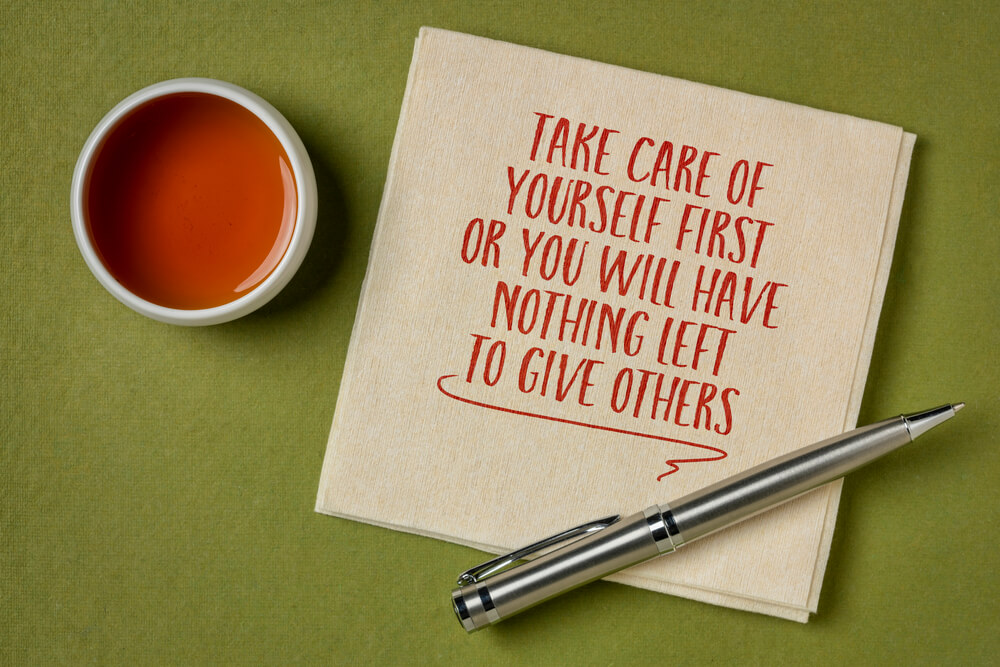
You wake up early every day to care for your spouse. They have been battling (Cancer, Alzheimer; ‘s, Parkinson’s, Multiple Sclerosis, COPD, etc.) for a couple of years or more, and you are their primary caregiver or care partner. You have always been there for them. Make sure that they take their medications, eat, shower/bathe, get dressed, and take them to doctor appointments.
Lately, you have been feeling more tired than usual. You have been experiencing headaches, lower backaches and just feeling blah. You seem to be coughing more, but you think that you have a cold or your allergies are acting up. You keep going on with your day, ignoring what you are feeling. You keep hoping that all of these symptoms will go away, but they don’t. In fact, they are worsening.
One day you are taking your spouse to the doctor and collapse in the waiting room. You are rushed to the hospital, where you are diagnosed with pneumonia and severe exhaustion. You are admitted. What has become of your care-receiving spouse? Where are they? Who is with them? Who is helping them?
You are now forced to take a break and focus on your own health. After three days, you are released but you are still not completely healed. You are still exhausted and still have pneumonia. What will you do now? Will you take the time to rest your body and let it fully heal or will you jump right back into being the primary care giver and probably take another health hit?
When the care giver has a health crisis the care receiver still has to be taken care of and they may have to be placed in a facility for a while or hired help will come into the home to help or other family members may help out. The care receiver may start declining more quickly. The decline may be physical, emotional, mental or all three. Cognitive decline and disorientation are real issues that may happen as well.
If you want to provide the best possible care to your loved one, then you must prioritize your own health needs. When you neglect your own healthcare needs, you are doing your care receiver a disservice. Neglecting your own health needs can impact your ability to make good decisions and provide effective care. When you don’t feel well, you are more likely to be more irritable, more impatient, and less attentive to your care receiver’s needs.
Understanding Family Caregiving
Being a family caregiver can be a rewarding experience, but it can also come with many challenges and health risks. Family caregivers provide unpaid care to a loved one who is unable to care for themselves due to illness, disability, or aging.
Family caregiving can be a full-time job, and it can be physically and emotionally demanding. Caregivers often find themselves juggling multiple responsibilities, such as managing medications, providing personal care, and coordinating medical appointments. This can lead to stress, exhaustion, and burnout.
In addition to the demands of caregiving, family caregivers may also be at risk for health problems. Caregiving can be a source of chronic stress, which can weaken the immune system and increase the risk of chronic diseases. Caregivers may also be at risk for depression, anxiety, and other mental health issues.
It’s important for caregivers to prioritize their own health and well-being. This includes taking breaks when needed, seeking support from family and friends, and accessing community resources. Caregivers should also make time for self-care activities, such as exercise, hobbies, and relaxation.
If you are a family caregiver, it’s important to recognize the challenges and risks of caregiving and take steps to protect your own health and well-being. By taking care of yourself, you can better care for your loved one and enjoy the rewards of caregiving.
Physical Health Risks of Family Caregiving
Increased Risk of Chronic Conditions
As a spouse caregiver, you may be at an increased risk of developing chronic conditions such as heart disease, diabetes, and arthritis. This is because caregiving can be physically demanding and stressful, which can lead to poor health behaviors such as lack of exercise, poor diet, and inadequate sleep. Caregivers may neglect their health needs to care for their loved ones.
Weakened Immune System
Caregiving can also weaken your immune system, making you more susceptible to infections and illnesses. This is because stress can suppress your immune system, making it harder for your body to fight off infections. Additionally, caregivers may be exposed to infectious diseases through their care duties.
Physical Exhaustion
Caregiving can be physically exhausting, especially if you are caring for someone who is bedridden or has mobility issues. This can lead to fatigue, muscle strain, and other physical health problems. Caregivers may neglect their own self-care needs, such as getting enough rest and exercise, which can exacerbate physical exhaustion.
To lessen these physical health risks, it is important for care givers or care partners to take care of themselves. This includes eating a healthy diet, getting enough exercise and sleep, and seeking support from others. It is also important for caregivers to take breaks when needed and to ask for help when necessary. By taking care of your own physical health, you can better care for your loved one.
Mental Health Risks of Family Caregiving
Depression and Anxiety
It’s common for spousecaregivers to experience symptoms of depression and anxiety. According to the American Psychological Association, caregivers are more likely to have depression and anxiety than non-caregivers. This can be due to the stress of caregiving, lack of social support, and the feeling of being overwhelmed and isolated.
Increased Stress Levels
Family caregivers often experience high levels of stress due to the demands of caregiving. This can lead to physical symptoms such as headaches, fatigue, and muscle tension. Chronic stress can also lead to long-term health problems such as heart disease and diabetes.
Emotional Burnout
Emotional burnout is a state of emotional, physical, and mental exhaustion caused by prolonged stress. It’s common for family caregivers to experience emotional burnout due to the demands of caregiving. Symptoms of emotional burnout include feeling overwhelmed, irritable, and emotionally drained. I definitely do not want you to get to this stage.
To prevent mental health risks, it’s important for caregivers to take care of themselves. This can include seeking support from friends and family, taking breaks from caregiving, and seeking professional help if needed. Remember, taking care of yourself is just as important as taking care of your loved one. Self-care is not selfish, it is necessary.
Social Health Risks of Family Caregiving
Social Isolation
As a spouse caregiver, you may find yourself spending most of your time caring for your loved one and neglecting your own social life. This can lead to social isolation, which is associated with negative health outcomes such as depression, anxiety, and cognitive decline.
To combat social isolation, it is important to make time for yourself and maintain social connections. This can be as simple as scheduling regular phone calls or visits with friends and family, joining a support group for caregivers, or participating in activities you enjoy.
Relationship Strains
Family caregiving can also strain relationships with other family members and friends. This is especially true if there are disagreements about the best way to care for your loved one or if some family members are not contributing to the caregiving responsibilities. Everyone’s family relationships put the “fun” in dysfunction. We all deal with this crap.
To prevent relationship strains, it is important to communicate openly and honestly with family members about your caregiving responsibilities and needs. Set boundaries and delegate tasks to other family members to ensure that you are not shouldering the entire burden of caregiving alone. Consider seeking the help of a mediator or therapist if disagreements continue to arise.
Financial Health Risks of Family Caregiving
Being a family caregiver can have a significant impact on your financial health. In this section, we will discuss the two main financial health risks associated with family caregiving: loss of income and increased expenses.
Loss of Income
As a family caregiver, you may need to reduce your work hours or quit your job altogether to provide care for your loved one. This can result in a significant loss of income, which can be particularly challenging if you are the primary breadwinner in your household.
According to the National Center for Biotechnology Information, family caregivers who must reduce work hours, exit the labor force, and forego income and benefits can experience significant reductions in available financial resources. This loss of income can have long-term financial consequences, including reduced retirement savings and Social Security benefits.
Increased Expenses
Providing care for a loved one can also result in increased expenses. You may need to purchase medical supplies, pay for transportation to medical appointments, or hire a home health aide to provide additional care. These expenses can quickly add up and put a strain on your finances.
The Centers for Disease Control and Prevention notes that caregivers can be at increased risk for negative health consequences due to the financial stress associated with caregiving. It is important to carefully track your expenses and explore options for financial assistance, such as government programs or community resources.
Prevention and Relief Strategies
Self-Care Practices
Taking care of yourself is ESSENTIAL to being a good caregiver. Here are some self-care practices you can use to reduce stress and promote your own well-being:
- Exercise regularly: Exercise can help reduce stress and improve your mood. Try to get at least 30 minutes of moderate exercise most days of the week.
- Eat a healthy diet: Eating a balanced diet can help you maintain your energy levels and promote your overall health.
- Get enough sleep: Getting enough sleep is essential to your physical and emotional health. Try to get at least 7-8 hours of sleep each night.
- Take breaks: Taking regular breaks can help you recharge and prevent burnout. Try to take short breaks throughout the day and plan for longer breaks when possible.
- Practice relaxation techniques: Relaxation techniques like deep breathing, meditation, and yoga can help reduce stress and promote relaxation.
Support Networks
Having a support network can help you manage the challenges of caregiving. Here are some ways to build and maintain a support network:
- Join a support group: Joining a support group can help you connect with other caregivers who understand what you’re going through.
- Reach out to family and friends: Family and friends can provide emotional support and practical assistance.
- Consider respite care: Respite care can provide you with a break from caregiving responsibilities and give you time to recharge.
Professional Help
Sometimes, professional help may be necessary to manage the health risks associated with caregiving. Here are some resources you can turn to for help:
- Talk to a healthcare provider: Your healthcare provider can provide guidance on managing your own health and well-being.
- Seek counseling: Counseling can provide emotional support and help you develop coping strategies.
- Consider hiring a professional caregiver: Hiring a professional caregiver can provide you with additional support and allow you to take a break from caregiving responsibilities.
By taking steps to prevent and lessen the health risks associated with caregiving, you can take care of yourself and provide better care for your loved one.
Conclusion
Being a family caregiver can be a rewarding experience, but it can also be a challenging one. As you have learned, there are several health risks associated with being a caregiver. These risks can affect your physical, mental, and emotional health.
It is important to recognize these risks and take steps to lessen them. This may include seeking support from other family members or friends, joining a caregiver support group, or seeking professional help from a therapist.
Remember, taking care of yourself is just as important as taking care of your loved one. By prioritizing your own health and well-being, you can ensure that you are able to provide the best possible care for your loved one.
Below is a summary of the main health risks associated with being a family caregiver:
| Health Risk | Description |
| Physical Health | Caregiving can lead to physical health problems such as fatigue, back pain, and sleep disturbances. It can also increase the risk of chronic conditions such as heart disease and diabetes. |
| Mental Health | Caregiving can cause stress, anxiety, and depression. It can also lead to feelings of isolation and loneliness. |
| Emotional Health | Caregiving can be emotionally taxing, leading to feelings of guilt, anger, and frustration. It can also cause relationship strain with other family members. |
By being aware of these risks and taking steps to reduce them, you can ensure that you are able to provide the best possible care for your loved one while also taking care of yourself.






